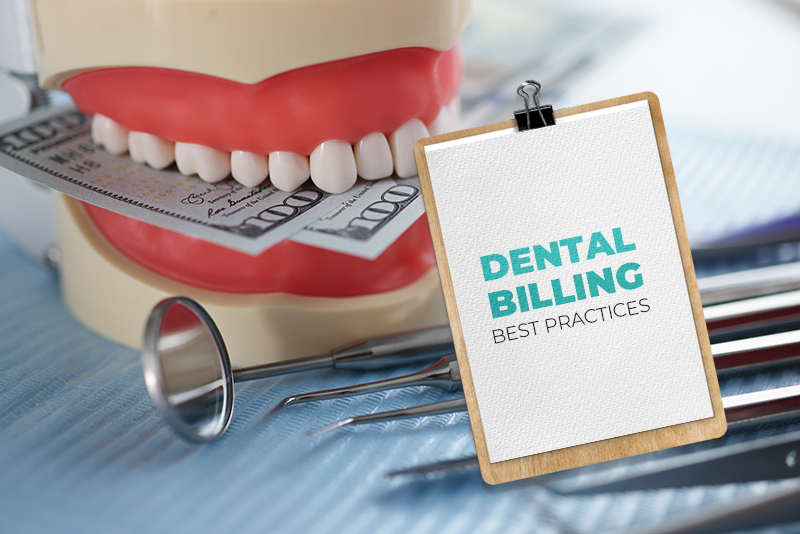Dental insurance billing is one of the most critical operations for a dental office. A proper dental billing system is important to collect payments on time for dental services performed in a practice. Dentists can rely on professional dental billing companies to handle the complex claim submission tasks. Insurers may deny claims due to many reasons including wrong or missing claim information, down coding, delay in submitting claims and more. Effective revenue cycle management strategies are also necessary to keep any dental office profitable.
Best Dental Billing Practices
Let’s check out some best practices that can help ensure successful dental insurance billing.
Make it easy for patients to pay
Provide diverse payment methods that make it easy for patients to pay on time. While some patients are tech-savvy, others may not understand how to utilize online payment options. Make sure that your practice implements both online payments and traditional payment methods, which will prevent any payment delays. Some of the popular payment methods that work include credit and debit cards, online payment portal, cash, and auto-payment options on specified dates.
Focus on pre-authorization
Pre-authorization or prior authorization refers to the process wherein the payer authorizes to cover the prescribed procedures before the services are rendered. Before sending claims for certain treatments, some dental plans need dentists to first receive preauthorization. A preauthorization provides written advance approval for the planned service, which is generally valid for 60 days. Some treatments that require advance approval or preauthorization include those categorized under “major,” scaling, root planning, etc. Pre-authorizations are basically a form where the patient’s insurance company would state how much they’re covering for the treatment and the co-pay amount if there’s any. It helps keep the patients updated on their expected co-pay amount and contributes to effectively planning the treatment.
Implement a streamlined dental billing process
Having the right dental billing strategy in place is critical for practices to run smoothly so that providers can enhance collections, while keeping overhead costs low.
To streamline the dental billing process –
- Assign roles and responsibilities for each person on the dental team – such as who’s handling dental eligibility verification, assigning codes, submitting claims and more.
- The dental billing process is quite technical and requires a very systematic approach and close attention to detail. Take support from a designated insurance coordinator or dental insurance billing service, so that an efficient billing expert can handle every aspects of billing ranging from claim submission to claim follow-up, and appeals for denied claims. Outsourcing these time-consuming dental billing processes frees up the provider’s time to connect with patients, increase treatment plan acceptance, set goals, and much more.
- Have a clear understanding of each step in the dental billing process. Dental billing includes many services such as patient enrolment, appointment scheduling, insurance verification/authorization, payments posting, accounts receivable management, and insurance claim processing.
- Update your dental software. Stay up to date with technology and train your front office billing staff on current billing and coding changes.
Accounts Receivable Follow-Up
Accounts receivable is the money owed to the practice for the services provided, but not yet collected. Timely follow-up of claims is key to avoid cash flow issues. Practices must take effort to initiate a follow-up process, if a claim hasn’t been paid by an insurance company within a 30-day period.
Take steps to –
- check out the reason for claim denials
- identify missing information
- assign the right codes on the claims
- resubmit the claim
Reliable dental billing outsourcing companies implement effective AR follow-up strategies to prevent further late payments or claim denials. A/R follow-up process involves key stages such as – initial evaluation of the policies, analysis and prioritizing which carrier has not paid, and finally following up with the patients for payments.
Stay up to date with coding changes
Assigning wrong codes are one of the major reasons for claim delays and denials. Several new ICD, CDT, and CPT code changes come into effect each year. It is crucial for any practice’s billing and coding staff as well as dental coding companies to stay up to date with the coding changes and guidelines.
Outsource to the Right Billing Service
Choosing the right outsourcing partner is a crucial step for any practice. Professional dental billing companies will keep their staff educated on the current best billing practices. Make sure the company provides the services of AAPC- and AHIMA- certified coders, and their services are HIPAA-compliant. Also, check the company’s data security policies, service quality and turnaround time.
Practices can consider implementing such best practices to enhance practice growth and revenue. Dental offices can choose a dental billing company that provides the services of a dedicated project manager, and a highly skilled team working as an extension to their practice.




